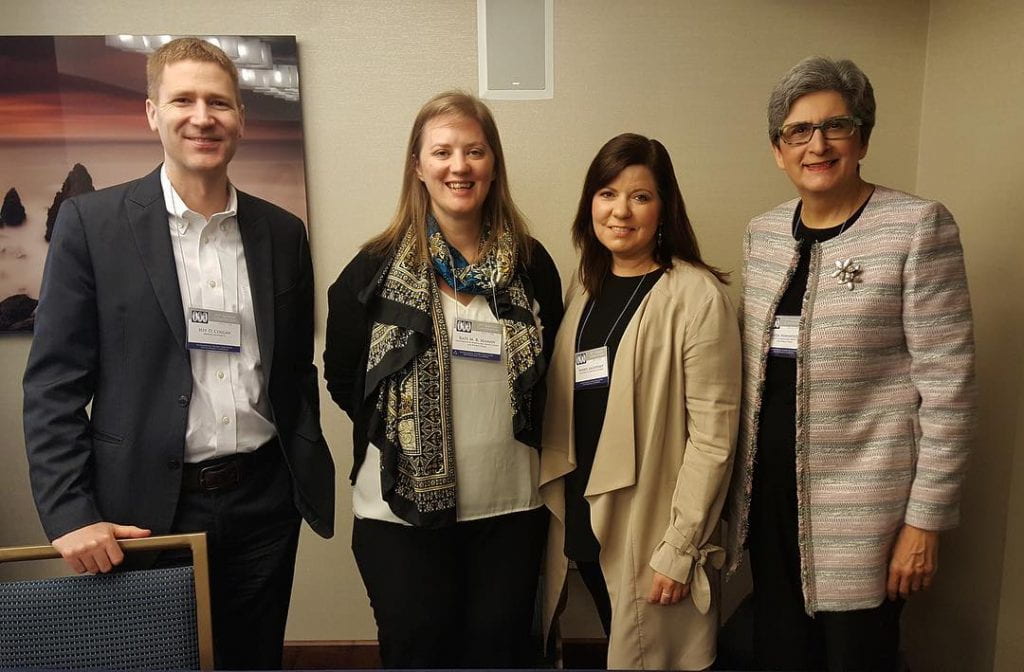One of the five programmatic series that the Bahá’í Chair for World Peace explores is Global Governance. In 2018, the Bahá’í Chair for World Peace began a series of conversations focused on the future of the international order. Over the coming weeks we will be posting short reflections on the ideas discussed, and the solutions offered for improving international relations. These reflections will be posted on our blog on a weekly basis, and will offer insight into our ongoing learning process.
These conversations have taken place through a series of panels and roundtables at both the International Studies Association’s Annual Conference (ISA) and at regional international studies conferences. The discussion has been focused on an examination of the international order, and also an exploration of the academic approach to international relations.
The ISA conferences offer an exciting forum for these conversations. Founded in 1959, the ISA is one of the oldest interdisciplinary associations with a focus on understanding international affairs. Its membership is made up of academics, practitioners, policy experts, private sector workers and independent researchers. The annual conference offers a chance for members to network, to explore new ideas and cutting edge research.
The first in the ongoing discussions was a roundtable held at the 2018 Annual Conference in San Francisco, CA. The roundtable, What comes next? Rethinking the Rules of the Liberal International Order. The discussion was chaired by Professor Hoda Mahmoudi, Research Professor and the holder of the Bahá’í Chair for World Peace and Dr. Kate Seaman, the Assistant Director at the Baha’i Chair for World Peace.
The participants included Professor Jeff D. Colgan, the Richard Holbrooke Associate Professor in the Department of Political Science and Watson Institute for Public and International Affairs at Brown University and, Professor Sheryl Lightfoot who is Anishinaabe, a citizen of the Lake Superior Band of Ojibwe, enrolled at the Keweenaw Bay Indian Community in Baraga, Michigan, Senior Advisor to the President on Indigenous Affairs, Associate Professor in First Nations and Indigenous Studies and Canada Research Chair in Global Indigenous Rights and Politics at The University of British Columbia.

From L-R: Professor Jeff Colgan, Dr. Kate Seaman, Professor Sheryl Lightfoot, Professor Hoda Mahmoudi
The roundtable discussions took as a starting point the increasing discussions about the decline of the Liberal Order, coupled with the rise in nationalist, and populist sentiment in various election cycles across the globe. Rather than focusing on the decline of the order the roundtable reflected on what might come next. Each participant was asked to reflect on a series of questions, listed below, which examined how the current power structures are changing, and what the potential is for the creation of a new, more inclusive, and more legitimate international political structure.
Questions Discussed:
- What are the underlying and defining rules of the current international order?
- How inclusive are these rules and who is excluded by them?
- How do the current rules of the international system designate power to certain actors and how could this be changed?
- What transformations have we seen in the current international order in recent times?
- If current trends continue what is the likely impact on the international order?
- Is the international order declining or transforming?
- If it is transforming what do you think the outcomes of this transformation might be?
- What should the foundational rules of a new international order be?
The discussion identified the need for change and transformation in the current international order, particularly in relation to the structural inequalities and limited nature of representation. These inequalities contribute directly to the perception of illegitimacy, and the lack of representation only compounds this. The question then becomes whether we need to fundamentally rethink the foundational rules of the system in order to restructure. Within the discussion there was less certainty about this, and also concern about what it would take for this to occur, given that the last large-scale transformation occurred in the end stages of World War Two.
The roundtable provided a solid foundation for the following series of conversations. We will be posting about these each Friday to share our learning process, and the solutions discussed in relation to the future of the international order.
About the Author:
 Kate Seaman is the Assistant Director to the Bahá’í Chair for World Peace where she supports the research activities of the Chair. Kate is interested in understanding normative changes at the global level and how these changes impact on the creation of peace.
Kate Seaman is the Assistant Director to the Bahá’í Chair for World Peace where she supports the research activities of the Chair. Kate is interested in understanding normative changes at the global level and how these changes impact on the creation of peace.
You can find out more about the Bahá’í Chair by watching our video here.
